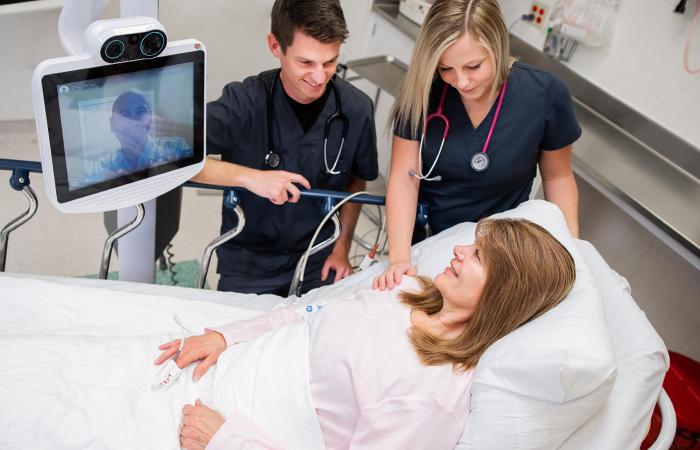Emergency Care and Telemedicine Services
We make every effort to ensure that people who live and work in Oconto County, as well as those who travel through or vacation in our county, get the best emergency care possible.

For emergency department patients at HSHS St. Clare Memorial Hospital, the expertise of emergency department physicians at HSHS St. Vincent Hospital and HSHS St. Mary’s Hospital Medical Center in Green Bay are available 24 hours a day through the use of telemedicine. Telemedicine is the use of technology to electronically exchange medical information and provide medical services to patients.
About Our Telemedicine Program
Our emergency department telemedicine program brings board-certified emergency department physicians to our local emergency department through real-time videoconferencing. When a doctor or advanced practice provider would like to discuss a case with another emergency room physician, a consultation is seconds away. Emergency telemedicine connects patients and emergency providers from two or more locations and is used to evaluate and treat patients. Our board-certified emergency physicians at HSHS St. Vincent and St. Mary’s Hospitals in Green Bay provide:
- Trauma evaluations and specialized assessments for patients
- Assistance with triage decisions
- Help identifying patients for admission to HSHS St. Clare Memorial Hospital, eliminating unnecessary transfers to another hospital
HSHS St. Clare Memorial Hospital utilizes advanced practice providers (physician assistants and advanced registered nurse practitioners) experienced in emergency medicine to provide care within our emergency department. Advanced practice providers work to the full extent of their education and function independently with minimal oversight. They make clinical decisions and develop a plan of care for patients and may collaborate with emergency department physicians via telemedicine.
Benefits of Telemedicine Services
We’re here to provide patients with timely emergency care close to home. Through our telemedicine program, we can provide more accurate and efficient decisions about your care. This real-time video evaluation enhances the ability of trauma specialists at HSHS St. Vincent and St. Mary’s Hospitals to render timely and effective treatment.
Both patients and health care providers benefit greatly from telemedicine.
For patients, our emergency telemedicine program provides:
- Timely treatment close to home
- Reduced travel time
- Access to board-certified emergency physicians
- Improved quality of care
For our emergency department providers, the emergency telemedicine program provides:
- Specialty consults to help make decisions about your care
- Input from board-certified emergency physicians without having to send patients to Green Bay
- Educational opportunities and mentoring
- Increased efficiency
- Improved patient outcomes
Frequently Asked Questions about Telemedicine
- Videoconferencing between patients and health care providers
- Transmitting still images electronically for interpretation by a physician at a remote location.
- Remote monitoring of vital signs